-
THE YOUNG ZWEIG
Zweig was born in Vienna to a wealthy Jewish family. His father was a textile manufacturer, and his mother came from a Jewish banking family. As early as his teens, Zweig sent poems and articles to literary journals and corresponded with important literary figures. He also started a collection of manuscripts which included manuscripts of Goethe and Beethoven's works. Later, this collection came to include a catalogue of Mozart's works written in Mozart's own hand.
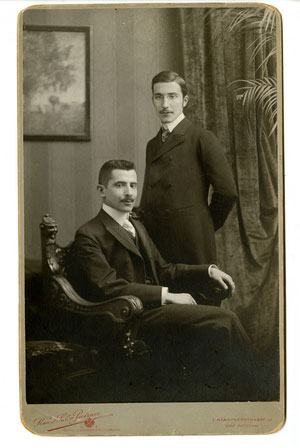 Stefan Zweig, standing, with his brother Alfred in Vienna, circa 1900.
Stefan Zweig, standing, with his brother Alfred in Vienna, circa 1900. -
UNIVERSITY DAYS
Zweig studied Philosophy at the University of Vienna and in 1904 earned a doctoral degree. In those student years Zweig published his first book of poetry, as well as various pieces in the most prestigious newspaper in Vienna, the Neue Freie Presse, whose editor was Theodore Herzl, the leading figure in the Jewish National Movement. Having proven his talent, Zweig was exempted from working in the family business.
 1901.jpg) Zweig's First Book of Poems, Silberne Saiten, (Strings of Silver) 1901
Zweig's First Book of Poems, Silberne Saiten, (Strings of Silver) 1901 -
THE EUROPEAN TRAVELLER
In the following decade Zweig moved constantly between Vienna, Berlin, Paris and Brussels. During this period he made the acquaintance of famous poets, writers and artists such as Auguste Rodin, Rainer Maria Rilke, Romain Rolland, W.B. Yeats, Pirandello and many others. It was during this time that he started to write novellas and dramas which soon became very popular.
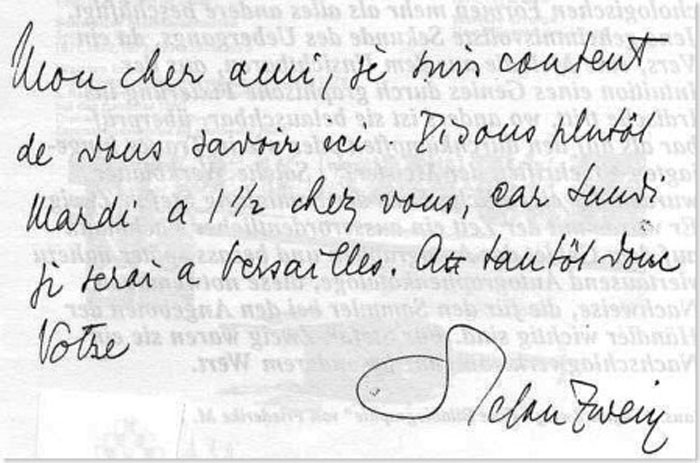 Stefan Zweig's note in French to one of his Parisian Friends
Stefan Zweig's note in French to one of his Parisian Friends -
STEFAN ZWEIG IN WW I
When WWI broke out, Zweig, a patriotic Austrian, at first came out in favor of the war. Zweig was conscripted and assigned to serve in the Austrian Archives of the Ministry of War. Having been exposed to the horrors of the war, Zweig underwent a significant change, and wrote a fervent anti-war drama called "Jeremiah" which won the acclaim of his friend, the famous author Thomas Mann. It was at that time, that Zweig adopted an extreme pacifist position, as did his friend the French novelist Romain Rolland. He then moved to Switzerland until the end of the war. Zweig remained a pacifist all of his life and advocated for the unification of Europe.
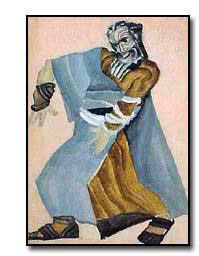 Poster of the Play Jeremiah by Zweig, the Ohel theatre, Palestine 1929,A. El-Hanani
Poster of the Play Jeremiah by Zweig, the Ohel theatre, Palestine 1929,A. El-Hanani -
THE SALZBURG PERIOD (1919-1933)
In 1920, Zweig married Friderike Maria von Winternitz (whom he divorced in 1938), and moved into a grand house in Salzburg. In the following years he wrote a series of novellas and biographical works, which were full of emotional tension and situations of social and psychological crises revolving around issues such as gambling, prostitution, adultery, and suicide. Zweig's works became extremely popular, and were criticized by some of his colleagues as "railway carriage reading". Among these novellas were Amok, Fear, Compulsion and Twenty-Four Hours in the Life of a Woman, while his biographical subjects included Marie-Antoinette, Joseph Fouché and Magellan.
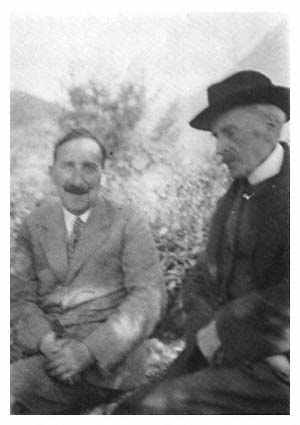 Stefan zweig with Romain Rolland, Villeneuve, Switzerland, 1933
Stefan zweig with Romain Rolland, Villeneuve, Switzerland, 1933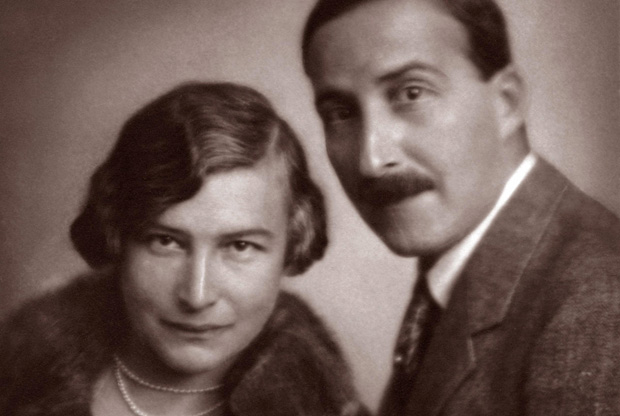 Friderike and Stefan Zweig in 1925
Friderike and Stefan Zweig in 1925 -
THE RISE OF THE NAZIS
With Hitler's rise to power in 1933, Zweig's books were condemned in Germany and later banned. Fascism was on the rise in Austria as well, and in 1934 the police came to search Zweig's home. Zweig left his house, never to return again. It was then that he divorced his first wife and moved to London. Later he wrote that at that time he sensed the heavy clouds that were hanging above. At this point, Zweig dispersed his papers and sold his manuscript collection.
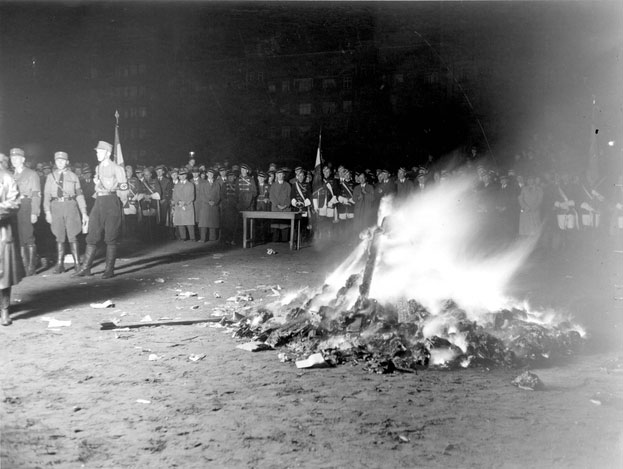 Nazis burning books, Berlin, 1933
Nazis burning books, Berlin, 1933 -
1934 – 1939 - LONDON
In 1939, Zweig married his secretary, Lotte Altmann. During these years Zweig did not come out against the Nazis or, in support of the persecuted Jews, and was criticized for it by major Jewish figures like Hannah Arendt. He seems to have wanted to carry on with his life in London without much interference. Yet, it was at this time, that his writing started to center around tormented figures, both literary and historical, who are in perilous situations. It was during this period that he wrote the biographies of Mary Queen of Scots and Marie-Antoinette, the novel Beware of Pity, and the novella The Chess Story which bears autobiographical elements.
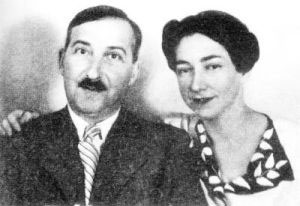 Stefan and Lotte Zweig
Stefan and Lotte Zweig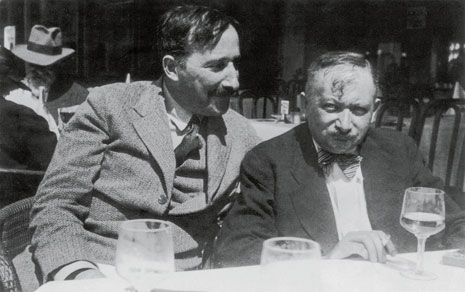 Stefan Zweig with Joseph Roth, Austrian-Jewish novelist, Ostende, Belgium, 1936
Stefan Zweig with Joseph Roth, Austrian-Jewish novelist, Ostende, Belgium, 1936 -
LONDON - NEW-YORK - PETROPOLIS
Zweig and his wife received British citizenship, but were unhappy. In the World of Yesterday, which Zweig wrote before his death, he describes the Jewish refugees in London, as "ghosts" looking for a country to receive them. In 1940 Zweig left for New-York only to discover that he was once again surrounded by refugees, reminding him of the terrible events in Europe. Just a few months later the Zweigs, having taken a tour of South-America, left for Petropolis, Brazil, not far from Rio de Janeiro, where they hoped to have a chance for a fresh start. Zweig even wrote a book: Brazil – The Land of the Future.
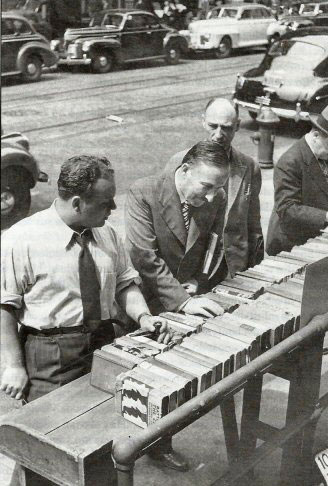 Stefan Zweig in New York, 1941
Stefan Zweig in New York, 1941 -
SUICIDE LETTER
On February 22nd, 1942, Stefan Zweig and his wife Lotte, having taken an overdose of barbiturates, were found dead in their apartment in Petropolis. She was wearing her kimono, he, his shirt and tie. The previous evening Zweig had played chess with his neighbor, gone home and written a suicide note, explaining his decision to leave the world.
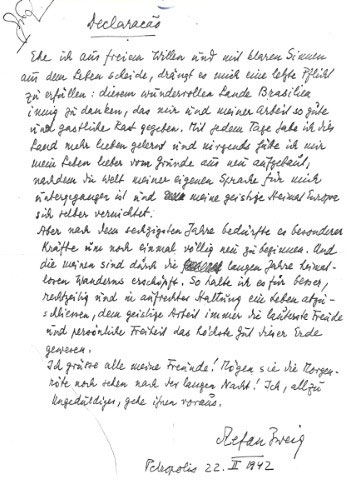 Stefan Zweig's suicide letter, NLI
Stefan Zweig's suicide letter, NLI -
HOUSE IN PETROPOLIS
The Zweigs' house in Brazil was later turned into a museum and is now known as Casa Stefan Zweig.